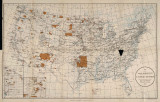| OCR Text |
Show REPOET OB THE COB6~ISSIONEg OB IXDIAN AFPAIRS. 71 F. JBBIGATION. The Secretary of the Interior is given the discretionary power to reserve from location, entry, sale, allotment, or other appropriation any lamb within any Indian reservation valuable for power or reservoir sites. He may also cancel any trust patent for any allotment which may be located within any power or reservoir site or upon lands required for irrigation purposes after proper reimbursement and upon condition that the allottee be granted other lands. (Sees. 13 and 14, act of Jnne 25,1910, 38 Stat. L., 855.) 11. COVEENMEOAFT T EE INDIACNQU NTBY. A. CONTEACTII. It is unlawful to induce any Indian to execute any contract, deed, or mort-gage to convey any land or any interest therein held 4 the United States in trust, or to offer same for record. (See. 5, act of Jnne 25,1910, 36 stat. L., 865.) DECISIOXS. u. S. u. J. P. ALLEN ET AL. The United States has the right to appear as party plaintiff in suit in the federal court to recover restricted lands illegally sold by allottees of the Five Civilized Tribes. (Judge Amidon's decision of June 8, 1910; U. S. Court or Appeals, eighth circuit.) U. S. u. CELEBTIN(E2 l5 U. S., 278). Legislation oi Congress must be construed in favor of the Indians. In the absence of subjection in terms of the individual Indian to state civil and criminal jurisdiction, and a denial of further jurisdiction by the United States, a statute will not be construed 8.8 a renunciation of jurisdiction by the United States of crimes committed by Indians against Indians on Indian reservations. U. S. 0. SUTTON (215 U. S., 291). Congress has power to prohibit the introduction of liquor into the Indian country. The limits of an Indian reservation are not changed by allotments in severalty during trust period, and where allotments are subject to restrictions as to alienation the prohibition against liquor continues to be effective. |




















































































































































































